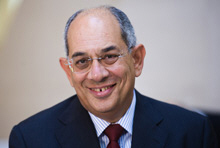
Typical street scene in Santa Ana, El Salvador. (Photo: iStock)
IMF Survey: Currency Debate Seen As Symptom of Deeper Problem
October 8, 2010
- Disagreement on exchange rates symptom of deeper problem, says IMFC Chairman
- Rebalancing of the global economy needed
- Elements of IMF governance reform package coming together
The head of the IMF’s policy steering committee, Youssef Boutros-Ghali, said the current debate on exchange rates is a symptom of deeper problems in the world economy that need to be resolved through quiet diplomacy and global cooperation.

Egyptian finance minister and head of the IMF’s policy steering committee, Youssef Boutros-Ghali, said nothing is agreed until everything is agreed on IMF governance reform (IMF photo)
GLOBAL ECONOMY
On IMF reform, he noted that only a comprehensive agreement would have a chance of winning broad support.
The IMF-World Bank Annual Meetings are under way in Washington DC at a time of increasing strain in the global economy. Boutros-Ghali, the Chairman of the International Monetary and Financial Committee (IMFC), spoke to IMF Survey online about the problems facing the global economy and the prospects for reaching agreement on governance reform ahead of the meeting of the Leaders of the Group of Twenty (G-20) industrialized and emerging market economies in Seoul in November 2010.
IMF Survey online: The 2010 Annual Meetings of the International Monetary Fund and the World Bank are under way. What are the big topics on the agenda this year?
Boutros-Ghali: The biggest topic is the reform of the institutions. It’s time that we implemented all those reforms that we said we needed or that we agreed we would do.
The second biggest topic is the world economy. Are we out of the woods? Do we still have pitfalls? The world economy is not recovering as fast as we would have liked it to recover. Is there a problem? Do we need to do anything?
We had all the intentions of rebalancing the economy. The deficit countries had to move into surplus and the opposite had to happen. It’s not happening. Now, why is it not happening? And what is it that we can do to make it happen?
And, of course, as a symptom of all of this, there is the ongoing discussion, fairly vivid, about exchange rates. And that, too, is an issue that needs to be addressed within the confines of the IMF.
IMF Survey online: When the IMFC meets, will exchange rates be on the agenda? What progress do you think will be made?
Boutros-Ghali: Look, the exchange rate issue will be on the agenda, but, typically, it will not be on the public agenda. These are issues that you solve quietly in closed rooms, and try to find the common ground of all the parties involved about how we want to deal with the issue.
The exchange rate is one symptom of a deeper problem. And typically, that problem has more than one symptom. We just happened to latch on to the more obvious one, but there are other things that can be done to address the same issue and resolve the same problem. This will need to be handled quietly and in a spirit of cooperation.
IMF Survey online: Tied up with the issue of exchange rates is the wider issue of rebalancing the global economy. Will ministers be able to make progress on that?
Boutros-Ghali: Well, the more we talk about the issue, the more progress we make, even if we don’t come to an understanding on common measures. But the more we discuss the issue, the more we have a better understanding of what the problem is. And, therefore, eventually we will come to a solution that deals with all the issues of all the parties involved.
These things take time and a lot of effort. It’s not something that you just walk into a room and resolve. It is something that needs quiet discussions, quiet diplomacy to get things moving.
IMF Survey online: You also mentioned the issue of reforming the way the IMF is run. What do you think will happen?
Boutros-Ghali: I’m hoping we’re going to come to an agreement on what it is we need to do, so that the G-20, when they meet in a month or so, can take the decision and we’re done. All the elements are almost there. We have all the bits and pieces. We just need to string them together, agree on a final shape, and give the go-ahead. This, I hope, will happen this time.
IMF Survey online: There is the issue of quotas, selection of the head of the IMF, and the makeup of the IMF’s Executive Board. How do all these elements fit together?
Boutros-Ghali: They all fit together. It’s part of one global package. Last year, I called for a package whereby each participant, each party to the negotiation would find some element where he would say we won this. We gave up that, but we got in exchange this. And unless we have a package where each and every party can say I have a piece that is for me, we won’t have an agreement. And I think now all of the elements you just mentioned are part of that package, where each party is going to point to one piece where he has achieved a small victory, even though there’s another piece where he has had to give up something.
IMF Survey online: What I hear you saying is that it’s almost all or nothing when it comes to IMF governance?
Boutros-Ghali: Definitely. It’s going to be one package and it’s the same principle that is used in the World Trade Organization: Nothing is agreed until everything is agreed.


